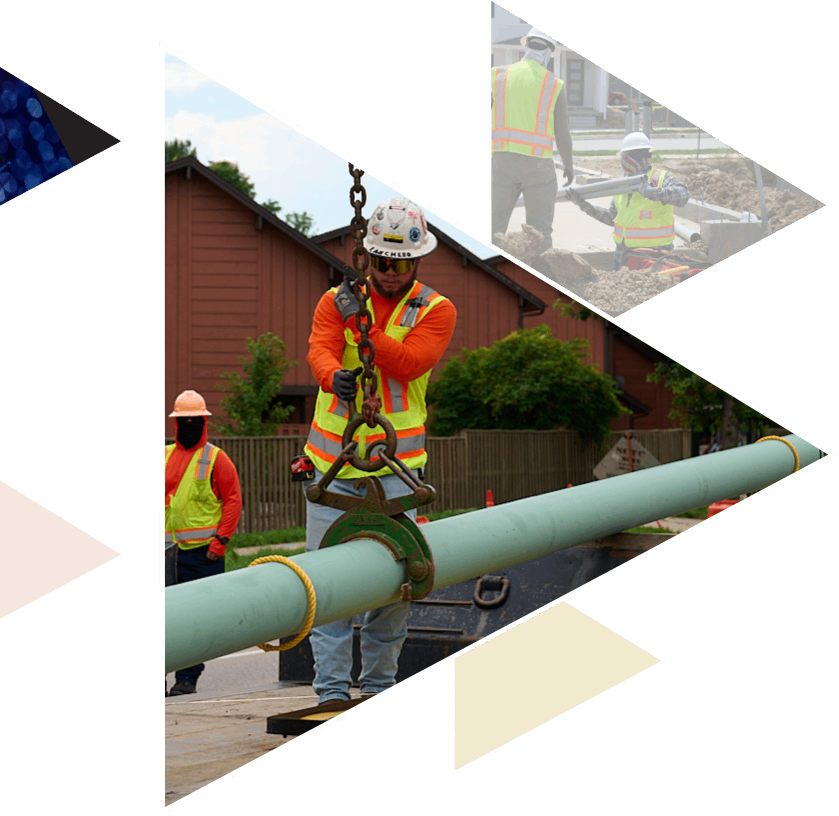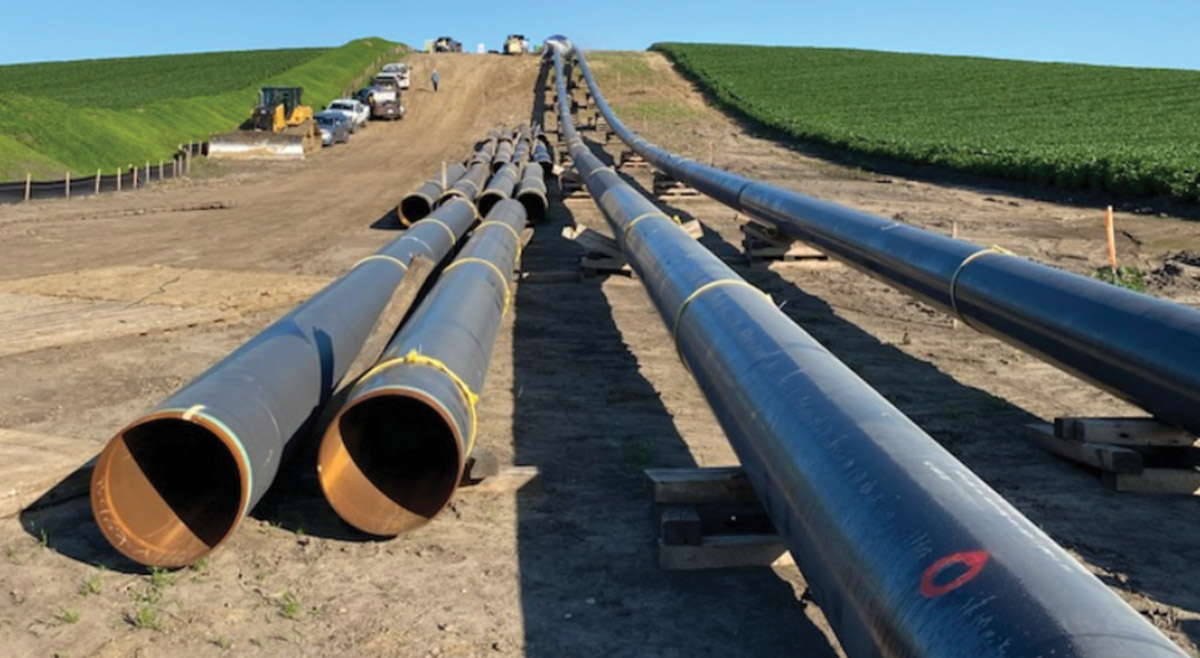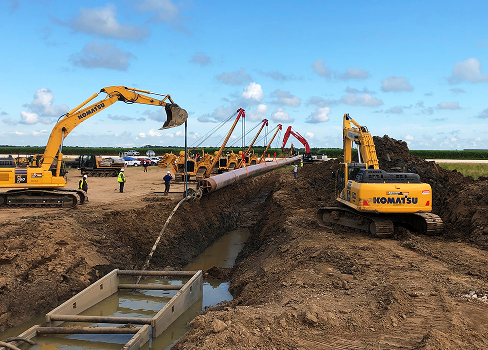The Essential Guide to Comprehending Pipeline Construction Solutions and Their Significance
Pipeline Construction services are basic to the transportation of important resources such as gas, water, and oil. These services involve careful preparation and execution, adhering to rigorous security and environmental criteria. As the market adapts to contemporary challenges, recognizing its ramifications and components becomes significantly essential. What variables add to the expanding value of these services in today's economic situation? The complying with areas will discover these important aspects.
Review of Pipeline Construction Services
Pipeline Construction solutions encompass a range of activities vital for the installment and maintenance of pipes made use of to carry numerous substances, consisting of oil, water, and gas. These services are crucial for guaranteeing the risk-free and reliable movement of sources from one area to another. The process commonly begins with detailed planning and style, which thinks about governing requirements, ecological considerations, and logistical challenges.
When preparation is full, excavation and grading of the land are carried out to prepare the website for Pipeline installation. This is complied with by the real laying of the pipelines, which entails welding or signing up with sections together to produce a constant circulation course. After installation, extensive screening is done to assure honesty and safety and security. Maintenance services are likewise offered to deal with any kind of issues that may arise in time. On the whole, Pipeline Construction solutions play a pivotal role in sustaining framework for power and water circulation.
Key Components of Pipeline Construction
An effective Pipeline Construction task counts on numerous vital parts that assure the safe and effective installation of the Pipeline system. First, extensive site assessments are crucial, as they determine the environmental and geographical factors that might impact Construction. Next, the option of proper materials, such as pipes and installations, is crucial for protecting resilience and compatibility with the carried compounds.
Advanced Construction strategies, including trenchless modern technology and directional boring, enhance effectiveness and reduce ecological effect. Reliable project monitoring is an additional vital part, coordinating labor, equipment, and timelines to fulfill job objectives.
Furthermore, interaction among stakeholders, including designers, professionals, and neighborhood authorities, guarantees alignment on project requirements and requirements. Lastly, thorough quality assurance procedures throughout the Construction process make sure conformity with industry standards and make best use of the Pipeline's operational life expectancy. Jointly, these components create the backbone of a successful Pipeline Construction project.
Safety And Security Requirements and Regulations in Pipeline Construction

Improving Regulative bodies, such as the Occupational Security and Health Management (OSHA) and the Pipeline and Hazardous Products Security Management (PHMSA), established forth certain demands that regulate Construction practices. These include protocols for tools usage, employee training, and emergency response procedures. By implementing these criteria, Construction firms not just safeguard their staff members but additionally safe and secure public depend on. Eventually, extensive safety and security measures add to the long-lasting success of Pipeline jobs, ensuring they fulfill both ecological and operational expectations.
Ecological Considerations in Pipeline Projects

Environmental factors to consider are important to the planning and implementation of Pipeline projects. These jobs need to examine potential effect on communities, water sources, and local wildlife. Performing thorough environmental influence evaluations (EIAs) is essential, enabling stakeholders to identify and alleviate risks before Construction starts.
Safeguarding delicate locations, such as wetlands and environments, typically calls for applying particular layout features or different directing to minimize disturbance. In addition, Pipeline operators are charged with creating strategies for avoiding leaks and spills, which can have disastrous results on the environment.
Engagement with regional communities is crucial, as public concerns can result in job adjustments that boost environmental management. Conformity with laws set by ecological companies guarantees that jobs meet sustainability requirements, promoting a balance in between framework requirements and environmental preservation. Eventually, resolving environmental factors to consider not just safeguards nature yet additionally advertises community depend on and you can try here job feasibility.
The Duty of Modern Technology in Pipeline Construction
Modern technology plays an essential role in modern Pipeline Construction, enhancing performance and precision. Advanced checking techniques enable accurate planning and implementation, decreasing ecological effect and project hold-ups. In addition, the combination of automation and robotics enhances operations, reducing labor prices and improving safety and security on Construction websites.
Advanced Checking Techniques
Advanced evaluating methods play an important role in the effective execution of Pipeline Construction tasks. These techniques take advantage of innovative innovation to guarantee specific mapping and analysis of the surface where pipelines will certainly be mounted. Methods such as Geographic Details Solution (GIS), LiDAR (Light Detection and Ranging), and 3D modeling make it possible for engineers to examine the landscape and visualize, recognizing environmental concerns and prospective obstacles. By using these advanced tools, groups can enhance precision ready and positioning, significantly minimizing the risk of mistakes throughout Construction. Furthermore, real-time information collection permits prompt changes and informed decision-making throughout the job lifecycle. Inevitably, these surveying technologies contribute to boosted efficiency, security, and sustainability in Pipeline Construction initiatives.
Automation and Robotics

Economic Influence of Pipeline Infrastructure
Pipeline facilities plays a vital duty in helping with and forming local economic climates profession. By offering a dependable ways of moving oil, gas, and other commodities, pipes lower transportation costs and boost supply chain efficiency. This framework brings in financial investment, stimulates job creation, and promotes economic growth in bordering areas.
The Construction and maintenance of pipelines add considerably to neighborhood economic situations, developing numerous work possibilities in numerous fields, from design to labor. The influx of tasks typically causes boosted costs in regional companies, even more reinforcing financial activity.
Additionally, pipelines boost power safety by making sure a steady supply of resources, which is critical for residential demands and commercial operations. As regions come to be interconnected through Pipeline networks, they access to wider markets, increasing competition and economic resilience. The financial impact of Pipeline framework is diverse, affecting both prompt regional economies and wider regional advancement.
Future Trends in Pipeline Construction Providers
The future of Pipeline Construction solutions is advancing in reaction to technical improvements, regulatory modifications, and expanding environmental factors to consider. Advancements such as drones and robotics are enhancing examination and maintenance procedures, boosting safety and performance. Automation is poised to reduce labor prices and enhance accuracy in Construction procedures. Additionally, the boosting focus on sustainability is motivating companies to embrace eco-friendly materials and techniques, straightening with global initiatives to reduce carbon footprints.
Regulative structures are additionally adapting to deal with environmental influences, promoting greater transparency and liability in Pipeline tasks. The integration of smart modern technologies, including real-time monitoring systems, is expected to improve the dependability and efficiency of Pipeline networks. As power needs change towards eco-friendly resources, Pipeline Construction solutions will likely see a surge in tasks connected to biofuels and hydrogen transportation. On the whole, these fads show a transformative duration for the Pipeline Construction sector, concentrated on technology and sustainability.
Regularly Asked Inquiries
What Sorts of Pipelines Are Commonly Created?
Various sorts of pipes are generally created, consisting of oil, water, sewage, and gas pipes - Pipeline Construction Services. Each serves distinct purposes, assisting in the transport of vital sources throughout regions while adhering to security and environmental policies
For how long Does a Regular Pipeline Job Take?
The period of a common Pipeline project differs substantially, commonly ranging from several months to a couple of years. Factors influencing this timeline consist of job complexity, governing authorizations, and ecological factors to consider that should be addressed.
That Controls Pipeline Construction Firms?
Pipeline Construction business are controlled by various government, state, and local firms, this content including the Pipeline and Hazardous Products Security Management (PHMSA) and state utility commissions, making certain compliance with safety and security and environmental criteria throughout the Construction procedure.
What Are Typical Products Utilized in Pipeline Construction?
Usual materials made use of in Pipeline Construction include polyethylene, steel, and pvc. Each material supplies distinct benefits such as versatility, resilience, and resistance to deterioration, making them appropriate for different applications in transporting gases and liquids.

Just How Are Pipeline Construction Costs Estimated?
Pipeline Construction costs are approximated by assessing aspects such as product costs, labor rates, task complexity, environmental factors to consider, and regulative requirements (Pipeline Construction Services). Accurate price evaluation guarantees reliable budgeting and job preparation throughout the Construction procedure
Pipeline Construction services incorporate a variety of tasks crucial for the setup and maintenance of pipes used to transport different materials, consisting of water, oil, and gas. A successful Pipeline Construction task depends on several key elements that guarantee the efficient and secure installation of the Pipeline system. Advanced evaluating methods play an essential function in the effective execution of Pipeline Construction jobs. Numerous types of pipes are frequently created, including oil, gas, sewer, and water pipelines. Pipeline Construction prices are estimated by analyzing aspects such as material expenditures, labor prices, project complexity, ecological factors to consider, and regulative needs.